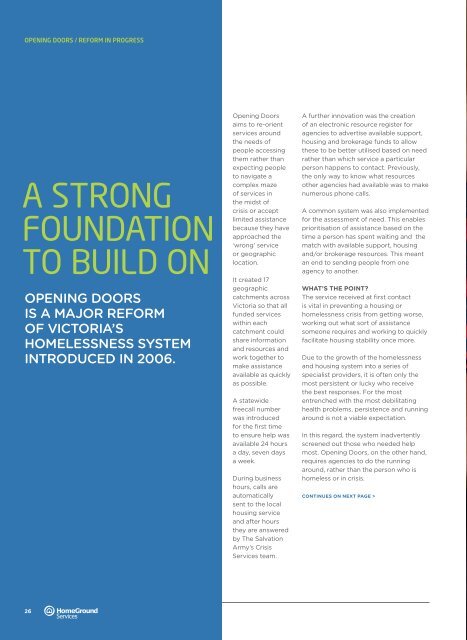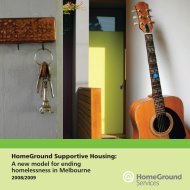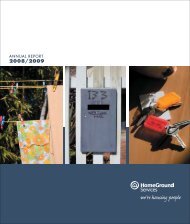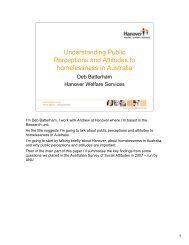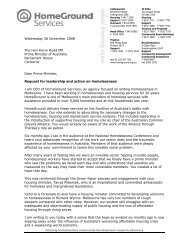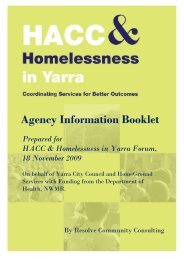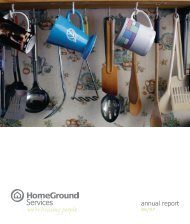HomeGround Annual Report 2010/11 - HomeGround Services
HomeGround Annual Report 2010/11 - HomeGround Services
HomeGround Annual Report 2010/11 - HomeGround Services
You also want an ePaper? Increase the reach of your titles
YUMPU automatically turns print PDFs into web optimized ePapers that Google loves.
OPENING DOORS / REFORM IN PROGRESS<br />
a strong<br />
foundation<br />
to build on<br />
Opening Doors<br />
is a major reform<br />
of Victoria’s<br />
homelessness system<br />
introduced in 2006.<br />
Opening Doors<br />
aims to re-orient<br />
services around<br />
the needs of<br />
people accessing<br />
them rather than<br />
expecting people<br />
to navigate a<br />
complex maze<br />
of services in<br />
the midst of<br />
crisis or accept<br />
limited assistance<br />
because they have<br />
approached the<br />
‘wrong’ service<br />
or geographic<br />
location.<br />
It created 17<br />
geographic<br />
catchments across<br />
Victoria so that all<br />
funded services<br />
within each<br />
catchment could<br />
share information<br />
and resources and<br />
work together to<br />
make assistance<br />
available as quickly<br />
as possible.<br />
A statewide<br />
freecall number<br />
was introduced<br />
for the first time<br />
to ensure help was<br />
available 24 hours<br />
a day, seven days<br />
a week.<br />
During business<br />
hours, calls are<br />
automatically<br />
sent to the local<br />
housing service<br />
and after hours<br />
they are answered<br />
by The Salvation<br />
Army’s Crisis<br />
<strong>Services</strong> team.<br />
A further innovation was the creation<br />
of an electronic resource register for<br />
agencies to advertise available support,<br />
housing and brokerage funds to allow<br />
these to be better utilised based on need<br />
rather than which service a particular<br />
person happens to contact. Previously,<br />
the only way to know what resources<br />
other agencies had available was to make<br />
numerous phone calls.<br />
A common system was also implemented<br />
for the assessment of need. This enables<br />
prioritisation of assistance based on the<br />
time a person has spent waiting and the<br />
match with available support, housing<br />
and/or brokerage resources. This meant<br />
an end to sending people from one<br />
agency to another.<br />
What’s the point?<br />
The service received at first contact<br />
is vital in preventing a housing or<br />
homelessness crisis from getting worse,<br />
working out what sort of assistance<br />
someone requires and working to quickly<br />
facilitate housing stability once more.<br />
Due to the growth of the homelessness<br />
and housing system into a series of<br />
specialist providers, it is often only the<br />
most persistent or lucky who receive<br />
the best responses. For the most<br />
entrenched with the most debilitating<br />
health problems, persistence and running<br />
around is not a viable expectation.<br />
In this regard, the system inadvertently<br />
screened out those who needed help<br />
most. Opening Doors, on the other hand,<br />
requires agencies to do the running<br />
around, rather than the person who is<br />
homeless or in crisis.<br />
CONTINUES ON NEXT PAGE ><br />
CLIENT FEEDBACK<br />
ON OUR STAFF<br />
RespectFUL, friendly, professional,<br />
patient, understanding, investigative,<br />
responsible, honest, empathETic, courteous,<br />
compassionate, polite, helpful, kind,<br />
excellent, explained my rights, respected<br />
my privacy, always knew what to do.<br />
26<br />
ANNUAL REPORT <strong>2010</strong> — 20<strong>11</strong> 27


